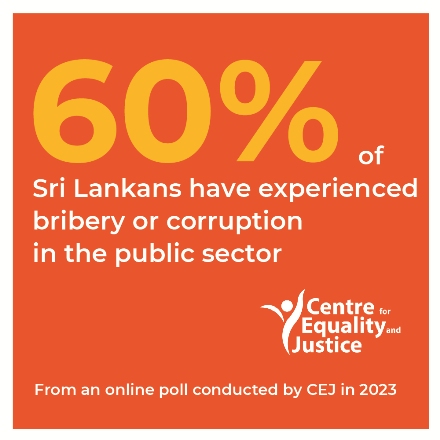(LANKAPUVATH | COLOMBO) – Have you ever had to give money to get out of a traffic violation? Have you ever been asked to “give something” to get a document passed through the municipal council? If so, you understand that in some cases, officials in positions of power ask for money or some favour in exchange for providing a service people are entitled to. In other words, they are asking for a bribe.
But did you know there is another form of bribery called sexual bribery? Many women and men around the world face sexual bribery when they are asked to perform a sexual act in return for a service.
The impact of sexual bribery
To be considered a sexual bribe, there must be three elements: quid pro quo (something given to get something), coercion (being pressured into doing these sexual acts) and abuse of power/authority (the official abuses the power and his role when he asks for sex in return for a service he must provide). These create a situation where victim-survivors do not have many options. These situations have many social, economic, and psychological costs and impacts.
Victim-survivors may feel stress and shame. They might feel isolated from their community and experience both internal and external stigma, where they feel they are “less” than everyone else. They may also lack the ability to access the public services they need. For example, they may not go to the police station to report it because they feel they will be ridiculed or that their complaint will not be noted. These are not unfounded fears. They have happened. Women are asked questions they feel ashamed to answer and they are seen as “easy” women when they complain.
Sometimes, the women may not look for healthcare services because they are scared to say they were raped or that they had to have sex with someone who is not their partner. They may fear being asked to do tests. They may worry about their families and villages finding out.
They may also not look for economic opportunities: some may find that a job offer is accompanied by a request for sexual acts. In such situations, most victim-survivors refuse or at least hesitate to accept the job offer.
Female heads of households are particularly vulnerable to this situation. These women are often seen as “easier prey” due to the absence of a male figure in the house. About 59.7% of women in female-headed households reported being approached for a sexual bribe, compared to 49.6% of women in male-headed households.
Where could sexual bribery take place?
While it happens in private companies too, current research suggests that it is more common in government institutions. This could mean a Grama Niladhari or a municipal or urban council officer. It can happen when applying for a job, asking for a promotion or raise, lodging complaints, or trying to get documents needed for everyday life (such as records, grants, and certificates).
There have also been some cases of lawyers being accused of asking for sexual bribes. In other cases, crisis situations have also resulted in people facing this. In all of these, the person being asked is put in a hard place. Their survival and safety can depend on agreeing to this act.
If someone can be asked for sexual favours at any of these places by any of the officials that they go to for the help they need and have a right to, they will stop going or face great discomfort. If there is no way to get justice, they will be disheartened. What has Sri Lanka done to reduce and stop this happening?
The Current Legal Context
Sexual bribery is a silent and largely ignored crime in Sri Lanka. It is a problem that deserves our attention because it happens a lot and it is harmful. It victimizes the person being pressured for sex, making them a victim-survivor. But many do not talk about this either because they do not know about it or it is not relevant to them. That is why the Centre for Equality and Justice (CEJ) has been working tirelessly over the last seven years to bring this crime to light.
Until recently, sexual bribery was not expressly considered a form of bribery in Sri Lanka. Though many, including CEJ and the Women Parliamentarians’ Caucus (WPC), raised concerns about this matter over the years, not much progress was made until 2023.
Thanks to several years of advocacy by CEJ, the new Anti Corruption Act passed in 2023, included the term “sexual favour” under its interpretation of gratification. This means that sexual bribery is now expressly cited as a punishable form of bribery and corruption in Sri Lanka.
What more can be done?
Many victim-survivors need social, economic, legal and psychological help. However, they are hesitant to access these services, due to fear of revictimization or lack of trust in the justice system.
Further, those who enter the legal process in Sri Lanka, have to face a host of other issues such as language barriers and a lack of sensitivity, especially when it comes to dealing with the police.
While working towards the prevention of sexual bribery is key, it is also important that victim-survivors are able to access justice in a meaningful manner. In order to bridge existing gaps, the government could provide training to police officers on dealing with victims in a sensitive manner, and make sure that documents within the legal process are provided in all three languages. While this is the ideal situation, at present, some documents are only provided in one or two languages. Further, it is important to ensure the proper implementation of existing laws and to strengthen the legal process by putting provisions in place to ensure relevant laws are reviewed periodically and amended as needed.
Moreover, trauma hotlines and psychological help could be provided at police stations and at legal offices, along with the relevant sensitivity training for police officers and lawyers.
If you wish to report an instance of sexual bribery to the Commission to Investigate Allegations of Bribery or Corruption, please call 1954 or email [email protected]
By M. Ranmuthugala, consultant to the Centre for Equality and Justice




